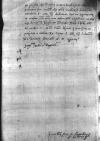Letter #1083
Ioannes DANTISCUS to Bona SforzaLöbau (Lubawa), 1534-01-11
Manuscript sources:
Auxiliary sources:
Prints:
| ||||||||||||||||||||||
Text & apparatus & commentary Plain text Text & commentary Text & apparatus
Serenissimae Reginali Maiestati Poloniae etc. [Dominae et] dominae meae [cle]mentissimae[1]
Serenissima Reginalis Maiestas et Domina, domina mihi clementissima. Humillimam orationum et servitutis meae commendationem.
Proficiscitur tandem ad Serenissimam Maiestatem Vestram generosus dominus
Ex
Serenissimae Maiestatis Vestrae Reginalis humillimus servus et capellanus
[1 ] Missing parts of address were written on piece of paper which is now lost


